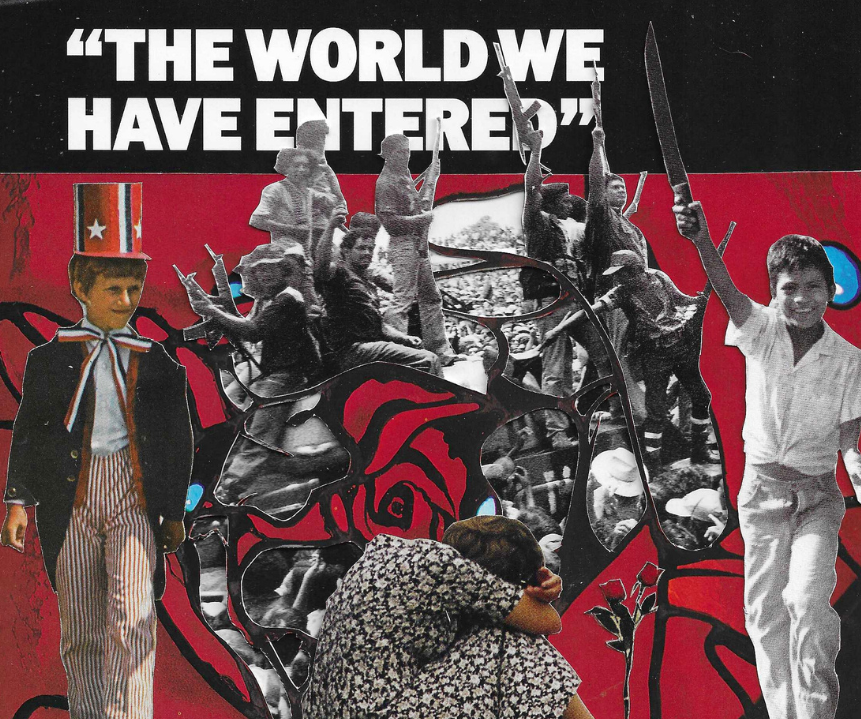Column: All Kamala Had to Say Was “Free Palestine”

By Beatz Alvarado
As stated by a comrade on election night over some beers, all Kamala Harris had to say was “Free Palestine.”
Instead, she and the Democratic Party told us to vote against Trump and fascism while funneling a record $22 billion to Israel’s genocide of the Palestinian people in the name of “democracy.”
If funding another genocide doesn’t define facism, I don’t know what does.
Harris’ failure to take a stronger stance on the genocide in Gaza was both immoral and politically stupid, as we learned on election night. Such a stance likely added to the huge loss in voters the Democratic Party experienced — over 10 million when compared to 2020.
Protecting Palestine could’ve been our rallying cry.
Instead, Harris and the Democratic Party blocked any possibility of left-wing populism, like the kind espoused by politicians like Bernie Sanders or Alexandria Ocasio-Cortez, from emerging in this country.
Harris ran a campaign that told us we’re all hallucinating about how bad conditions are in the U.S. and the world – from Palestine to the economy. This reality-avoidance helped pave the way for Trump’s right-wing populism that seeks a drastic change to the political landscape.
So, stop blaming the left for going too far left – those of us who voted third party voted with our conscience.
The New Democratic Party
Instead of uttering the words – “Free Palestine” – the Democratic Party proudly absorbed neoconservatives into their coalition, like Dick Cheney. Have y’all seen the movie “Vice?” He’s played by Christian Bale in a fat suit.
Cheney was George W. Bush’s vice president and this mf was the CEO of Halliburton when he came into office. Halliburton, an oil service company that runs some of the world’s largest fracking operations, was awarded at least $39.5 billion in federal contracts related to the Iraq war during the eight-year Bush administration.
These are the types of mfs who run the Democratic Party now, which puts the left wing back even further when it comes to U.S. and global politics.
But I will say, the left stands to gain some new blood.
Trump’s 2016 election is what pushed me to play an active role in changing conditions in the U.S. It took a minute to find my footing as a journalist-turned-activist-turned-organizer, so I’m writing this to help usher in new people who come over to the Dark Side after this year’s election.
If that resonates, welcome to the Dark Side. Now, let’s talk about what comes next.
The Dark Side
Trump’s right-wing populism is rooted in resentment. His base mostly resents professionals — lawyers, doctors, lecturers. But we learned that the working class will vote for someone who promises a complete overhaul of American politics – dare I say, a revolution?
He, of course, would be the last person to deliver on something like that. What we should take from this election is that without revolutionary ambitions, our next candidate won’t mobilize new people to vote, which is what we need to win.
For the left to replicate Trump’s success, we need to demand the world of our political candidates. This especially applies to local elections. We need to double down on what we know we deserve instead of what the Democratic Party is asking us to do, which is to adapt to conditions and move with them to the right.
Mayoral candidate Isabel Araiza garnering more than 11,000 votes in the Corpus Christi City Council race is proof that the left in Corpus Christi is growing.
Araiza has a reputation of not only asking for what we deserve, but demanding it, especially from millionaires and billionaires whose industrial plants will use most of our water and energy supply.
Despite Araiza’s turnout only being a fraction of what the pro-industry candidates turned out, 11,000 votes for someone like her is no small feat.
Our main takeaway from the local elections should be that we cannot settle for less than we deserve; we can only grow stronger from here.
Fuck it, I’m Dropping the C Bomb
Bear with me as I try to connect this bonkers election cycle to our collective potential to overthrow capitalism through a political and cultural revolution, which we’ve actually come close to in the past.
A free Palestine isn’t possible under capitalism. We need a political force in the U.S. seeking an alternative to capitalism.
Kamala Harris said that regardless of where public opinion is in America, the U.S. government’s “commitment to Israel’s security is ironclad.” Trump told his donors he will crush pro-Palestinian protests and deport demonstrators.
It’s a tough pill to swallow, but if you’re still figuring out where you stand on the political spectrum, it’s important to acknowledge that both major parties will continue to siphon our resources overseas to maintain U.S. imperial power regardless of how any Americans feel about it.
Capitalism has been our dominant economic system for about 240 years, about as long as slavery lasted in the U.S. The timing seems right to abolish capitalism in favor of a system chosen and governed by the working class.
The runoff election for the Corpus Christi City Council will be Dec. 14. We have four years until the next presidential election, and two years until we have another opportunity to run city council candidates who are unapologetic about what we deserve.
I’m hopeful that our collective anger will lead many of us to fight for what we deserve, but what makes me giddy is our ability to imagine a new world through the art we make.
We need a cultural revolution as much as we need a political one.
We Can’t Even Imagine a Third Party
Why can’t we imagine a world beyond capitalism? Late cultural theorist Mark Fisher says it’s because of “capitalist realism.”
In his 2009 book Capitalist Realism, Fisher argues that we have everything we need to escape the confines of capitalism, but it’s “capitalist realism” that keeps us stuck.
“Capitalist realism” is like a mental straitjacket that restricts our social and political vision of an alternative to capitalism. Alternatives like socialism or communism would redistribute the resources being hoarded by the millionaires and billionaires who run our country – just saying.
Fisher argues that for “capitalist realism” to exist, class consciousness has to recede. Class consciousness is the awareness of one’s social class, economic rank and shared interests among members of the same class. It’s not just class consciousness, but more specifically what he calls a subordinate “group consciousness.”
Fisher says that once we become conscious of capitalism’s trickery, like the belief that we deserve scarcity instead of abundance despite living in the richest country in the world (by net worth), “capitalism has to work extremely hard to avoid the possibility that people could determine their own lives and behave in more autonomous ways.”
The rise of neoliberalism in the ’70s is one of the ways in which capitalism has had to work hard to prevent a revolution.
Our Last a Chance at Revolution
In one of the last lectures before his death in 2017, Fisher explores the last time a cultural revolution came close to effectuating a political one, which happened in the late ’60s and early ’70s. A fusion of the counterculture with unionism led by the working class created the perfect conditions for a revolution.
The counterculture was led primarily by Black and working class musicians and was organized around opposition to the Vietnam War. Palestine could be this for us now, because it’s been broadcast into our lives in similar ways but with modern techniques.
These were the years of the rise of psychedelic rock legends like Jimi Hendrix and the birth of the Black Panther Party, not to mention poets like Maya Angelou, and writers like James Baldwin. Nowadays, it’s the algorithm that determines most of the content we are exposed to, but for the sake of this column, I’m going to talk about the Kendrick Lamar and Drake rap beef.
Lamar, who’s been compared to Bob Dylan for his literary contributions to the counterculture, eviscerated Drake lyrically in that beef. Drake is the poster child of capitalism so, for some of us, that felt like a victory against the commodification of rap culture.
But similar to Kamala Harris, Lamar didn’t utter the words. It was a huge distraction from the genocide in Palestine, and I’m guilty of watching that novela along with so many others.
This is another way capitalism has had to work hard to stamp out the beginnings of a revolution. Who knows why Kendrick Lamar hasn’t said anything, but what Fisher tries to get across in his lectures is that capitalism has created the perfect conditions for him not to.
What a loss.
The counterculture offers a vision of a liberated world.
In the ’60s and ’70s, the counterculture came on the heels of the civil rights movement and they created art during the 1970’s recession. This caused a collective awareness of different struggles and oppression that was freely expressed in the counterculture.
We survived a global pandemic coupled with the first economic recession of its kind, and it’s safe to say that the onslaught of attacks on the working class under Trump have already begun to shape the counterculture of our times, so we’re not too far from either.
The culture’s fusion with unionism created a working class consciousness that has yet to be replicated. Currently, unions are gaining some strength in the U.S., but the number of unionized workplaces is nowhere close to the numbers we saw before the rise of neoliberalism. We’ve got a long way to go if we want to replicate this.
The fusion between unionism and the counterculture in the ’60s and ’70s led to class-conscious demands that were not only bold, but imaginative. So, we should aim to replicate that and explore the millions of ways in which we can collaborate and experiment to free ourselves from the confines of capitalism. This the only way we can enact changes that are in true service of our collective liberation.
Maybe that’s where our focus should be – unionizing every workplace. We’d also need to take back the means of creating our own art – art that changes our material conditions.
Anything less is a temporary comfort or fleeting distraction prolonging our stay in this capitalist hellscape.
